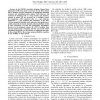Free Online Productivity Tools
i2Speak
i2Symbol
i2OCR
iTex2Img
iWeb2Print
iWeb2Shot
i2Type
iPdf2Split
iPdf2Merge
i2Bopomofo
i2Arabic
i2Style
i2Image
i2PDF
iLatex2Rtf
Sci2ools
129
Voted
ICC
2009
IEEE
2009
IEEE
User Profiling: A Method for Limited Feedback in OFDMA Systems
In the OFDMA downlink, obtaining Channel State Information (CSI) from users is necessary for the Base Station (BS) to optimize network performance by intelligently allocating resources and scheduling mobile stations (MS). However, the overhead of obtaining CSI is a large burden and therefore, schemes to reduce CSI are necessary for a realizable system. By considering a MS's coherence time tcoh and coherence bandwidth Bcoh, and exploiting this redundancy in the MS's CSI, the amount of feedback can be tailored to the specific user's profile and greatly decreased. Typically, reducing feedback results in more uncertainty in CSIT and performance degradation. However, in the proposed scheme, the CSIT's deviation from the true channel state is bounded, and thus can provide robust scheduling. Specifically, two BS schemes are suggested that either fix the average BER or the average outage probability regardless of user mobility or delay spread.
Related Content
| Added | 18 Feb 2011 |
| Updated | 18 Feb 2011 |
| Type | Journal |
| Year | 2009 |
| Where | ICC |
| Authors | Vinay R. Majjigi, Rajiv Agarwal, John M. Cioffi |
Comments (0)

